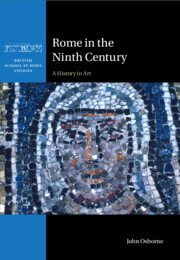Book contents
- Rome in the Ninth Century
- British School at Rome Studies
- Rome in the Ninth Century
- Copyright page
- Contents
- Figures
- Acknowledgements
- Abbreviations
- Ninth-century Popes
- 1 Introduction
- 2 Rome in 800: The Pontificate of Leo III
- 3 Paschal I, the Church of Santa Prassede and the Question of a ‘Carolingian Renovatio’ in Rome
- 4 Paschal I: Other Projects
- 5 Eugenius II, Gregory IV and Sergius II
- 6 The Gathering Storm: The Pontificate of Pope Leo IV (847–55)
- 7 Benedict III, Nicholas I and Hadrian II, and the Continuing ‘Greek’ Presence in Rome
- 8 The Last Hurrah: John VIII (872–82)
- 9 ‘Not with a Bang but a Whimper’
- Afterword
- Bibliography
- Index
7 - Benedict III, Nicholas I and Hadrian II, and the Continuing ‘Greek’ Presence in Rome
Published online by Cambridge University Press: 10 October 2023
- Rome in the Ninth Century
- British School at Rome Studies
- Rome in the Ninth Century
- Copyright page
- Contents
- Figures
- Acknowledgements
- Abbreviations
- Ninth-century Popes
- 1 Introduction
- 2 Rome in 800: The Pontificate of Leo III
- 3 Paschal I, the Church of Santa Prassede and the Question of a ‘Carolingian Renovatio’ in Rome
- 4 Paschal I: Other Projects
- 5 Eugenius II, Gregory IV and Sergius II
- 6 The Gathering Storm: The Pontificate of Pope Leo IV (847–55)
- 7 Benedict III, Nicholas I and Hadrian II, and the Continuing ‘Greek’ Presence in Rome
- 8 The Last Hurrah: John VIII (872–82)
- 9 ‘Not with a Bang but a Whimper’
- Afterword
- Bibliography
- Index
Summary
Spanning much of the third quarter of the century, the pontificates of Benedict III (855–858), Nicholas I (858–867) and Hadrian II (867–872) reveal a declining papal involvement in the patronage of architecture, though also considerable engagement with ecclesiastical issues of the day, including dramatically renewed contacts with Constantinople and the eastern Mediterranean in the aftermath of the definitive end of Byzantine Iconoclasm and the ‘Triumph of Orthodoxy’. In addition to the growing importance of the Roman secular aristocracy, whose domestic housing has been rediscovered in recent archaeology, evidence is surveyed for the continuing presence of a substantial Greek community in Rome, and for interest in the translation of Greek texts in the circle of the papal librarian, Anastasius. Among the most prominent survivals from these years is the tomb of St Cyril, the Byzantine missionary to the Slavs, in the lower church of San Clemente.
Keywords
- Type
- Chapter
- Information
- Rome in the Ninth CenturyA History in Art, pp. 161 - 195Publisher: Cambridge University PressPrint publication year: 2023

